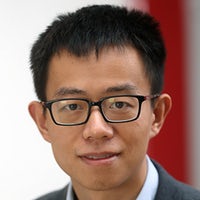- News
18 November 2019
Cardiff University’s Qiang Li wins UK ESPRC’s New Investigator Award
The New Investigator Award of the UK Engineering and Physical Sciences Research Council (EPSRC) has gone to Dr Qiang Li, a lecturer in Advanced Materials and Devices in the Sêr Cymru Research Group of Cardiff University’s School of Physics and Astronomy.
 Picture: Cardiff University’s Dr Qiang Li.
Picture: Cardiff University’s Dr Qiang Li.
Working with partners IQE plc, Rockley Photonics Ltd and the University of Macau in the project ‘Tunnel epitaxy: building a buffer-less III-V-on-insulator (XOI) platform for on-chip light sources’ (funded with £282,062 from 1 November 2019 to 31 October 2021), principal investigator Li’s research aims to develop an epitaxial crystal growth process to enable the direct integration of III-V on insulator (XOI) structures on silicon wafers.
By taking advantage of the crystallographic geography and selective area growth in confined spaces (using a process pioneered by Li), the project aims to achieve dislocation-free micro-sized thin films on insulators without needing to designs complex intervening buffer layers.
It is believed that efficient optical interconnects can be achieved through the direct growth of compound semiconductor devices on a mature silicon platform, producing cheaper, faster chips. Until now, it has been necessary to introduce buffers between the two materials, but this lengthens the manufacturing processes and brings challenges in combining different device components. A buffer-less platform can potentially support integration of III-V compound semiconductors with silicon waveguides and open up opportunities in silicon photonics.
“Compound semiconductors already complement silicon in many niche applications like 3D sensing and wireless communications,” says Li. “Through this project, we aim to explore a more creative approach to combine their unique physical properties with the silicon manufacturing platform.” As a proof-of-concept demonstration, micro-disk lasers will be fabricated to validate the optical quality of the III-V structures and highlight its potential for photonics integration.
“Dr Li is a very talented young researcher with an international network,” comments professor Diana Huffaker, Sêr Cymru Chair in Advanced Engineering and Materials. “He was headhunted to bring the III-V/Si epitaxy capability into the Ser Cymru Research Group,” she adds. “The EPSRC Award will serve as a foundation for him to launch his successful career at Cardiff.”
Competitively awarded by the EPSRC, New Investigator Awards are granted to support and develop the research careers of talented individuals who hold an academic lectureship position but have not previously led a research group. The award gives them an opportunity to manage a grant, establish and lead their own research team and assert their research independence. It should enable Li to recruit a postdoctoral researcher, develop an internationally competitive research program at Cardiff and build wider collaborations within the UK semiconductor community.
“It is an ambitious endeavour to develop this method to a point that allows the creation of useful integrated indium phosphide (InP) photonics on silicon,” commented the EPSRC on granting the award. “The proposal is highly relevant to Manufacturing the Future [an EPSRC’s funding theme spanning 271 grants totaling £354m], and offers significant opportunities for the compound semiconductor cluster in Cardiff.”
www.epsrc.ukri.org/funding/applicationprocess/routes/newac/nia


